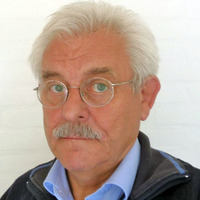Jaap den Hollander
University of Groningen, History, Emeritus
The phrase ‘beyond historicism’ is usually associated with Bielefeld historians like Hans Ulrich Wehler and Jürgen Kocka, who attempted to turn the study of history into a social science, but a better candidate would be the sociologist... more
The phrase ‘beyond historicism’ is usually associated with Bielefeld historians like Hans Ulrich Wehler and Jürgen Kocka, who attempted to turn the study of history into a social science, but a better candidate would be the sociologist Niklas Luhmann, who happened to teach as well in Bielefeld during the 1970’s and 1980’s. Luhmann had little affinity with the project of his colleagues from the history department. He took the opposite view that the social sciences suffered from a naive enlightenment view and should become more history minded. Like the historicists of the early nineteenth century Luhmann was indirectly inspired by the philosophy of Leibniz. Although Luhmann’s theory of social systems may seem miles away from the daily interests of most historians, it can be interpreted as an Aufhebung of historicism. This will be demonstrated for two important concepts, the autopoietic system which incorporates the historicist notion of individuality and the concept of second order observation which can be read as an abstract redescription of what historicists meant by the historical method.
Research Interests:
¿Estaba Niklas Luhmann peleado con la historia? ¿Cómo afectó esto las posibilidades para una colaboración fructífera entre la sociología y la historia? El libro es prologado por el historiador Jaap den Hollander./ Was Niklas Luhmann at... more
¿Estaba Niklas Luhmann peleado con la historia? ¿Cómo afectó esto las posibilidades para una colaboración fructífera entre la sociología y la historia? El libro es prologado por el historiador Jaap den Hollander./ Was Niklas Luhmann at odds with history? How this affected the possibilities for a fruitful collaboration between sociology and history? The book’s foreword is by the historian Jaap den Hollander. DOI: 10.13140/RG.2.2.26131.71203/1
Research Interests:
Research Interests:
Research Interests:
Research Interests:
A major lesson to be learned from narrativist philosophy of history since Danto is that history and science differ in the organization and presentation of knowledge rather than in their subject-matter. This insight is most often seen as a... more
A major lesson to be learned from narrativist philosophy of history since Danto is that history and science differ in the organization and presentation of knowledge rather than in their subject-matter. This insight is most often seen as a decisive argument in favour of the ‘literary’ or ‘cultural’ character of history. However, if their subject-matter does not create an insurmountable barrier between history and science, the insight leaves room, too, for a ‘historical’ approach to issues ordinarily believed to belong to the domain of ‘science’. A case in point is the subject of evolution. Thus the leading evolutionary biologist Ernst Mayr considers the nature of evolution to be historical rather than scientific. This might invite historians to overcome their fear of social Darwinism and to apply their own (narrativist) tools for organizing knowledge to evolutionary theory. This essay attempts to show that Niklas Luhmann’s theory of social evolution does just this by satisfying the criteria of historical representation as defended by narrativist philosophy of history. Luhmann’s system concept will be interpreted as a ‘colligatory concept’ in the sense meant by William Walsh. Furthermore, Luhmann’s idea that social systems are ultimately based on meaning processing will be shown to agree with the fundamental role assigned to meaning in Ankersmit’s recent work on historical representation.
Niklas Luhmann offers his readers an impressive theory of societal evolution, but leaves them in the dark about the transition from one societal system to another. So, we have to guess at the origins of modern, functionally differentiated... more
Niklas Luhmann offers his readers an impressive theory of societal evolution, but leaves them in the dark about the transition from one societal system to another. So, we have to guess at the origins of modern, functionally differentiated society. Perhaps, the Investiture Controversy around 1100 would be a good starting point, but the problem is that Luhmann does not allow for such detailed historical discussions. This raises the question of the relation between social systems theory and historical narration. The Foreword aims to elucidate this question without pretending to offer a definitive answer.
